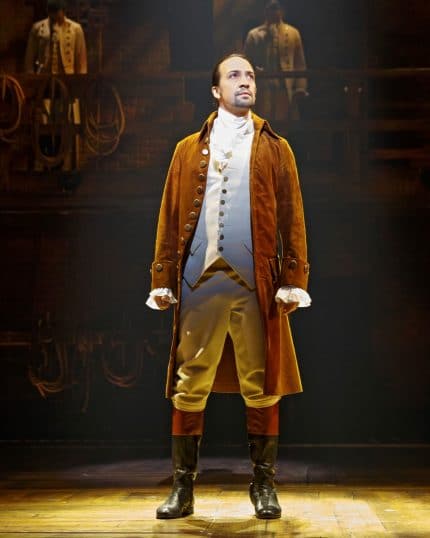What’s the secret behind the Hamilton hype?
“How does the bastard, orphan, son of a whore, go on and on, grow into more of a phenomenon?”

Lin-Manuel Miranda’s 2015 musical Hamilton is more than just a phenomenon. The show received a record-setting 16 Tony Award nominations (winning 11) and was awarded the 2016 Pulitzer Prize for Drama, making it just one of ten musicals to win in this category. The hype surrounding the show is immense, and there’s got to be a reason for it.
The first time I heard the recording, I was hooked. Somehow it all worked. On paper, the idea of hip-hop music to tell the story of the Founding Fathers sounds ridiculous, but somehow Lin managed to pull it off. Over the last 5 years, I’ve learned more and more about the show, the people on which it’s based, and Lin’s creative process. I was lucky enough to catch a performance on the West End, happily tuned in to Disney+ last week to see it once again, and I can guarantee I’ll be at the Lyric next year to see a stellar Australian production of the show.
Naturally, being the theatre nerd I am, there were things that stuck out to me every time I watched or listened to it. So today, I’m going to go through just a handful of the references or intricacies that I have noticed in Hamilton that I think justify the unbelievable hype surrounding the show. It’s undeniable a musical inspired by hip-hop will reference said genre of music, but there are so many other interesting theatrical tidbits. Some of these have been deliberately put into the show (and are explained in the Playbill or accompanying book, Hamilton: The Revolution), others may just be a coincidence, and some are just intelligent writing.
(Please note, this article contains spoilers)
“Nobody Needs To Know” from The Last Five Years – “Say No To This”
On a surface level, both of these songs have very similar situations: man cheats on his wife with another woman. On a much more explicit level, the phrase “nobody needs to know” is echoed in Hamilton, albeit transposed higher than that of TL5Y, but the musical sequence is identical. Lin is friends with Jason Robert Brown, and confirmed that this was a deliberate reference.
“The Modern Major General” from Pirates of Penzance – “Right Hand Man”
Washington’s verse of the song is really quick, and you may easily miss this one. His line “now I’m the model of a modern major general” is a direct reference to Gilbert and Sullivan’s song of the same name. Lin has said that he performed in Pirates of Penzance, and that G&S are major influences on his work.
“You’ve Got To Be Carefully Taught” from South Pacific – “My Shot”
Similarly to G&S, Lin has been very inspired by Rodgers and Hammerstein (and understandably so). Burr delivers some warning to Hamilton and the other abolitionists, saying “the situation is fraught / you’ve got to be carefully taught,” a clear reference to the song of the same name from South Pacific.

Various references to Shakespeare’s Macbeth – “Take a Break”
Near the song’s opening in Alexander’s letter to Angelica, he quotes the play saying “to-morrow and to-morrow and to-morrow creeps in this petty pace from day to day.” He then goes on to sing “I trust you’ll understand the reference to another Scottish tragedy without my having to name the play / they think me Macbeth, and ambition is my folly” and even goes as far as to compare his friends to characters in the play – “Madison is Banquo, Jefferson’s Macduff.” Although he initially doesn’t say the name of the play (instead referring to it as the Scottish Tragedy), he then goes right ahead to say it anyway… for those who aren’t aware, saying the name of the play in a theatre is considered a superstition. One could assume that his saying of the name acted as a trigger to the misfortune he faces from that scene onward. At the end of the song, Angelica seems to respond to his letter, singing “screw your courage to the sticking place,” a line said by Lady Macbeth when discussing her plan to murder Duncan in Act 1, Scene 7 of the play.
“Sit Down, John” from 1776 – “The Adams Administration”
This is where we start to get speculative. 1776 is a musical about John Adams and his efforts to push for American independence. The opening number of the show is aptly named “Sit Down, John” – it seems all too coincidental for Hamilton to exclaim “Sit down, John, you fat motherf–” during a song titled “The Adams Administration.”
“Cool” from West Side Story – “Yorktown”
This could be a total coincidence, but I like to think it was deliberate. Hamilton yells out “you have your orders now, go, man, go!” to the other troops. The specific choice of “go, man, go” feels to me like a gesture at “Cool,” where Riff uses the same phrase when instructing his peers.
Various hip-hop and R&B references
These were always going to exist. Some have been mentioned by Lin in the show’s Playbill, but others he said he wanted to keep a secret for viewers to pick out. The “Ten Duel Commandments” and Alexander’s spelling out of his name in “My Shot” are a homage to Biggie Smalls’ “Ten Crack Commandments” and “Going Back To Cali”; “Helpless” is a nice wink to Beyoncé’s “Countdown” in how particular syllables are stressed and how the musical phrasing sits, the repetition in “Meet Me Inside” is a nod to DMX’s “Party Up (In Here); and “Cabinet Battle #1” almost verbatim references Jay-Z’s “Izzo.” I could write an entire article on these ones, but instead I’ll refer you to a whole Spotify playlist of hip-hop and R&B tracks that can be heard in references throughout the Hamilton score.
Modulation in “Farmer Refuted”
This is a prime example of Lin-Manuel being cheeky with his writing. Hamilton remarks “don’t modulate the key then not debate with me” just after Samuel Seabury modulates the song a half step. Modulation is when the music changes from one tonality to another, in this case from C major to D flat major.

Friction between music and lyrics in all of King George’s songs.
In all 3 of his brilliantly funny songs, King George sings lyrics that directly contradict the movement of the music, creating friction. On “rise”, King George falls musically, and on “fall” he rises. Lin has admitted to taking this idea from Mary Poppins (in “Spoonful of Sugar” the same idea is used as Mary sings “makes the medicine go down“).
The foreshadowing of Phillip Hamilton’s death
Hear me out, this isn’t as ridiculous as it may seem. The first introduction that the audience get of Phillip is him playing piano with Eliza, counting from one to ten in French. Where is the only other time in the show we hear counting? “The Ten Duel Commandments.” If we break both musical sequences down, they’re exactly the same in terms of melodic composition, just with a half step difference – the French counting is in E, and the commandments are in F. This serves to musically foreshadow the fact that Phillip is fated to die in a duel. Musical motifs are rarely used for no reason, and I have no doubts that Lin was very deliberate in where he used this one.
References to the theatre
In the show’s opening number, we hear the ensemble say that they’re “waiting in the wings” for Hamilton. The wings in a theatre are the spaces side stage where actors enter and exit. During “My Shot,” we hear “Enter me, he says in parentheses,” a reference to how stage directions are often written in a script (except they’d never be in first person, it would be more likely to say “Enter Hamilton”). These could both possibly be meta-references to the fact that the characters are aware they are playing out a story, an idea that is reinforced by both the show’s opening and closing. We start our journey into the show listening to what is essentially an expositional prologue, with Burr and the other characters outlining what we can expect from the show – a device used often by Shakespeare, and seen in other musicals such as Sondheim and Wheeler’s Sweeney Todd. This device is mirrored in the ‘epilogue,’ “Who Lives, Who Dies, Who Tells Your Story” where the ensemble once again reflect on the action of the show and ask that question of both the characters and the audience. Eliza’s gasp in the show’s final moments has also been speculated to represent her seeing the audience, breaking the fourth wall and finally recognising the impact of her efforts – that a room full of people have come to see a show about Alexander and his legacy.
Hamilton is available now on Disney+ worldwide.
Presale for the 2021 Sydney season begins August 24. Visit hamiltonmusical.com.au for more information and to sign up now.




